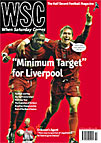 Rwanda as a nation state was close to extinction a decade ago, but the mixed-race side will line-up against the hosts Tunisia in the opening game of the ANC after financial backing from the country's president, as Alan Duncan writes
Rwanda as a nation state was close to extinction a decade ago, but the mixed-race side will line-up against the hosts Tunisia in the opening game of the ANC after financial backing from the country's president, as Alan Duncan writes
If we are to believe FIFA president Sepp Blatter’s assertion that “the philosophy of football is to offer hope”, then it goes without saying that some nations are more in need of football than others. While it is unclear exactly when Blatter started to spread the word, it would be hard to believe that the minute-long silence that followed his laying of a wreath at Rwanda’s genocide memorial in the central African country’s capital, Kigali, on April 10, 2002, did not help in shaping this view.
The sheer scale and brutality of the Rwandan genocide a decade ago – when the incumbent Hutu government ordered the massacre of the minority Tutsis – had appeared to spell the extinction of Rwanda as a nation state made up of two ethnic groups. Yet, on January 24, a football team comprising players from both communities will play the opening match of the African Cup of Nations against the hosts Tunisia, who are led by former France coach Roger Lemerre. In July last year, Rwanda had caused the biggest upset in the qualifying by defeating Ghana 1-0 in Kigali to reach their first international finals.
The country’s president, Paul Kagame, a Tutsi who appointed several Hutus to his government on being elected to power last August, has made every resource available to the team, starting with a three-week training camp in Marseille ahead of the finals.
Kagame last year allowed himself the relative indulgence of donating US$60,000 to the Council for East and Central African Football Associations (Cecafa) to which Rwanda belong. The trophy for the annual regional club competition was duly renamed the Kagame Cup. Whereas most regional tournaments in Africa struggle to get off the ground due to governmental reluctance to underwrite the organisational costs, Kagame has been only too prepared to host the last two (and soon the third) Cecafa Challenge Cups. The results have been all too evident with the current Rwandan champions, APR FC – the army team rather unsurprisingly – reaching the last eight of last season’s African Cup-Winners Cup, while the national team reached the semi-finals of last October’s Afro-Asian Cup and are on the verge of breaking into FIFA’s top 100 ranked teams.
President Kagame was recently to be found at the hospital bedside of one of the Rwanda squad’s four foreign-based players, Claude Kalisa. The Belgium-based defender had broken his leg in Rwanda’s elimination of Namibia in November’s preliminary World Cup round. The government, Kalisa was assured, would foot the bill for his rehabilitation.
While Rwanda’s Serbian coach, Ratomir Dujkovic, will take heart from the presence of Kalisa’s St Truiden team-mate and striker, Desire Mbonabucya, and the Gent midfield pair of Pape Mayele and Hamid Ndikumana, his side will as ever be reliant on its collective strength – a feat made easier with a largely home-based squad. Forwards such as APR FC’s Jimmy Gatete, who scored the crucial goals against Uganda and Ghana, and Jean Lomani are set to catch the eye of the European scouts, as will acrobatic goalkeeper Mohamud Mossi.
Caesar Kayzari, the brigadier general who heads Rwandan football, is undaunted by the team’s draw in a group including Tunisia and Guinea. “We eliminated Ghana so we don’t see ourselves as underdogs,” he says. Yet the twist to this particular tale is altogether closer to home and in the shape of an uncomfortable final group match with neighbours Congo DR – a nation that by best estimates has lost 4.1 million people in a war the West seems helpless to stop and which the current Rwandan government is accused of fuelling. Rather tellingly, Kayzari speaks only of the particular “socio-political aspects” of this match. But amid the inevitable battle cries and rumours of “witchcraft” that are certain to mark the build-up, this might just be a fitting day of remembrance for the heart of Africa.
From WSC 204 February 2004. What was happening this month